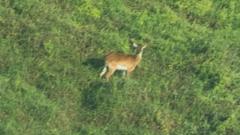The remarkable rescue of ten endangered flamingos highlights ongoing conservation challenges amidst illegal wildlife trafficking in Tunisia, while the species' population remains increasingly threatened by environmental factors.
Ten Endangered Flamingos Rescued from Smugglers in Tunisia

Ten Endangered Flamingos Rescued from Smugglers in Tunisia
Tunisia's Customs Authority successfully intercepts a smuggling operation, saving ten endangered flamingos destined for illegal trafficking.
In an impactful operation, the Tunisia Customs Authority has successfully saved ten endangered flamingos that were being trafficked by smugglers. The birds were found crammed into crates in the back of a lorry, with their wings, legs, and torsos bound, and were intercepted near the Algerian border on Sunday. The lorry was identified as having a Tunisian registration, prompting immediate action by officials.
Following their rescue, the flamingos have been returned to their natural habitat, as part of Tunisia's ongoing efforts to protect this vulnerable species. However, details regarding any legal repercussions for the smugglers remain unclear. Smuggling and hunting of flamingos are illegal under Tunisian law, reflecting the country's commitment to wildlife preservation amidst growing threats.
Conservationists point out that flamingos also face substantial risks from pollution and climate change, which are causing the wetlands they inhabit to dwindle. The greater flamingo, scientifically known as Phoenicopterus roseus, is recognized as a threatened species by the International Union for Conservation of Nature. Despite these challenges, recent data indicates a potential rebound, with estimates suggesting that at least half a million flamingos still exist in the wild.
North Africa is a critical stopover for migratory flamingos, who are frequently observed across Europe, West Africa, and Asia, with popular viewing spots including Djerba island and Korba Lagoon in Tunisia. The increasing awareness and protection efforts have contributed to a recent rise in their populations, underscoring the significance of continued conservation initiatives.




















